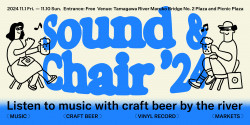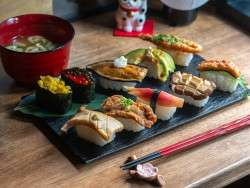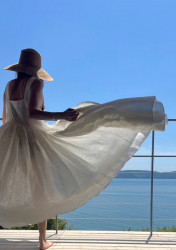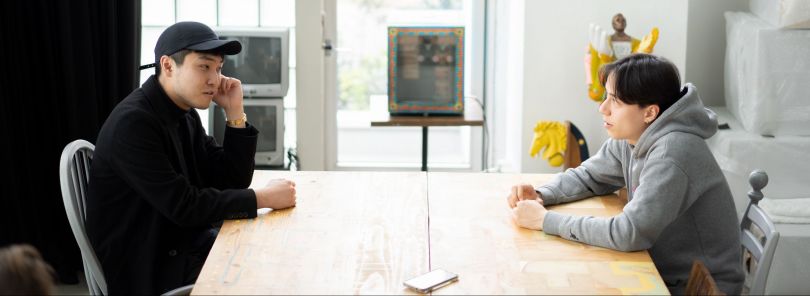
May 20, 2022
Wez Atlas x Nonomi
On performing at Shibuya Sound Riverse, Creativity and Collaboration
If this year’s Coachella bill is anything to go by, music festival lineups are becoming increasingly more multicultural, representing a diverse range of influences, identities and sonic tastes. The upcoming Shibuya Sound Riverse, curated by music distribution service, Friendship, is one such festival, showcasing a wide range of Japan-based artists from diverse backgrounds who operate in a variety of Japan’s musical scenes. Two such artists performing at the event are Japanese/American rapper Wez Atlas, and one of Wez’s frequent collaborators—Peruvian-born-and-raised Japanese producer and DJ Nonomi.
Metropolis sat down with the two artists to speak about their approaches to creativity and collaboration, how their backgrounds have influenced their creative output, and the future of the Japanese music scene.
Metropolis: When you’re gearing up for a set, do you guys go into a studio together and practice the way that it’s going to happen on stage?
Nonomi: So at the beginning, we will kind of build a setlist and have a pretty clear pregame plan of what we’re going to do. But then when we started incorporating more of a DJ aspect, we realized that we had all this flexibility. So sometimes, we’ll change the order of the songs like 30 minutes before we actually want to do it. But that flexibility allows us to adapt to the audience’s energy and adapt to our energy that day. So when we rehearse, we only check the flow of the song and we don’t really like to set things in stone too much.
WA: Yeah, we could even, in the middle of a show, say “no, skip that. Let’s do a different one.”
N: And I think of the shows we’ve had so far, we actually talk to each other on stage.
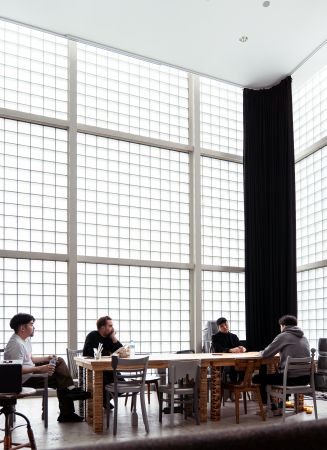
WA: It’s like we’re rehearsing.
M: In terms of when you’re recording, is it different from song to song, or do you guys have a pretty fixed way of doing things?
WA: Well, first of all, I work with several different producers. And so I think each with each producer, I have kind of a different process. With him, I feel like there are also several ways that we start working on a song. Sometimes I find some YouTube beat, and I make a demo on it, and then I show it to him. And then I just send him my raw vocal stems and then he makes a beat around my acapella. The other session we had last month, he had like, four loops….
N: He came into the session, I had four different, rough ideas. And I was like, you know “Pick your poison.”
WA: That was fun, though. Because there were four beats to choose from. Sometimes we just go in, and then we start something from scratch and that’s also nice, too.
N: We had done that in the past, where we come in and we start something from scratch, we don’t really know what’s going on, and then it kind of takes shape. But usually, we only have like, one, two hours, maybe three hours per session. And half of that is figuring out how it’s going to take shape. So I figured not only is it kind of boring for him because he has to watch me sculpt things slowly but at the same time it’s counterproductive because he’s not in his world, which is what I want for him as the artist. So I figured this other way—where we have some options—you can just pick one, and then we go from there. It’s more of a clear image where he can just hit the ground running.
M: You just released your own single last month. Is that something you’ve been working on for a while?
N: For a little bit. It was kind of impromptu in a way. I worked on it for a couple of months.
M: Are you thinking about doing more of your own material?
N: Definitely, yes.
M: In terms of how you approach that, you’ve been engineering and producing for a bunch of different artists for a long time. How do you think working with artists like Wez has shaped the stuff that you’re doing?
N: It’s very cool because when I work with Wez I’m catering to him, right? It’s like, my options are shaped towards his image. But when I do stuff for myself, it’s like “What would I do in his shoes? What would I ask of me in his shoes?” Working with him has given me that contrast and that perspective, where it’s very liberating when I do something for myself. But, at the same time, it’s very frustrating because I have all of these options.
WA: Yeah, I think the important thing is to not fall into the trap of perfectionism, where you’re putting so much importance on one song.
N: How do you go about that? With your bars. That’s something I want to know. I feel like you’re very meticulous about it.
WA: I used to do these exercises called morning pages. And that helped me have a very fluid stream of consciousness. You wake up in the morning and before you do anything you just sit in your chair, open your notebook and write three pages of just bullshit, basically. Just anything that comes to your head. You say, “Oh, man, I’m so sleepy. Man, I want to go back to sleep.” And that kind of helps with getting that voice in the back of your head that’s like “This is trash. That’s whack. Why would you even do this? That doesn’t even rhyme.” It helps make that voice disappear. I think that’s the voice that relates to perfectionism because there’s always going to be something wrong with it, you can’t be perfect, it’s more about a consistent output.
Viva(Ola) said this thing that I liked. He said: “When you turn on a faucet, first there’s a lot of brown, muddy water that comes out. But when you let it out for a while the water becomes clear.” He probably took it from someone famous [laughs].
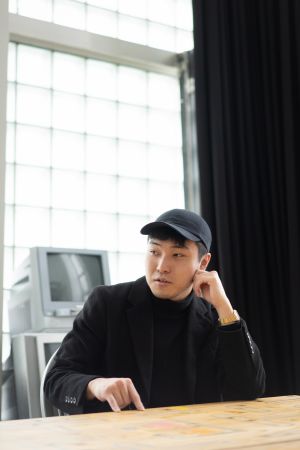
N: I completely agree. I did this internship and one of the things my boss at the time taught me was: “For an hour a day just make something that you know no one’s going to hear. Just play around with it, try to make it sound nice for you, and then delete it.” So every now and then I do what I call my “lab sessions,” and I just say “Okay, today, I’m gonna make a new synth patch. Or today I’m gonna go and make a really weird, bizarre, eclectic drumbeat and no one’s gonna hear it.”
M: Nonomi, do you have a particular direction for your solo project? The two tracks that are out at the moment are kind of unique in their own ways.
N: I’m keeping it pretty open and I think that aligns with my work so far because up till now I’ve done all kinds of work. With Wez, I’ve done hip hop and rap but I’ve also worked with R&B artists and more ballad-y type stuff. And before that, when I was still a student, I was nowhere near beat-making. I wrote stuff for like string quartets, and, you know, for plays and music for small indie video games, you know. So, if I were to say “I’m this kind of artist, or I do this style,” I think that would be a disservice to myself and a disservice to the people who want to listen to my stuff.
M: Do you think you’ll keep it instrumental or will you collaborate with vocalists?
N: Definitely collaborating, yeah. I definitely do want to collaborate with people. One of the reasons why I got into music is that when I was in high school, I was considering either economics or music. Back in high school, I was this very lonely, depressed, dude. I was like “You know what? I don’t want to be lonely no more.” The lifestyle that I saw in music, as opposed to economics, was a life where I wouldn’t be lonely.
M: You were born in Peru. When did you leave?
N: When I was 18, I went to the States to go to music school. And then at the beginning of last year, because of COVID, I had to go back home and spend some time there. And I was like “Man, this is boring, I’m not doing anything. I’m not furthering my career in music.” I was giving piano lessons and teaching here and there but I felt really stuck. And I was like “Hey, man, I have this Japanese nationality. I have the opportunity to work with amazing artists like Wez. I’ll just go and see what happens.”
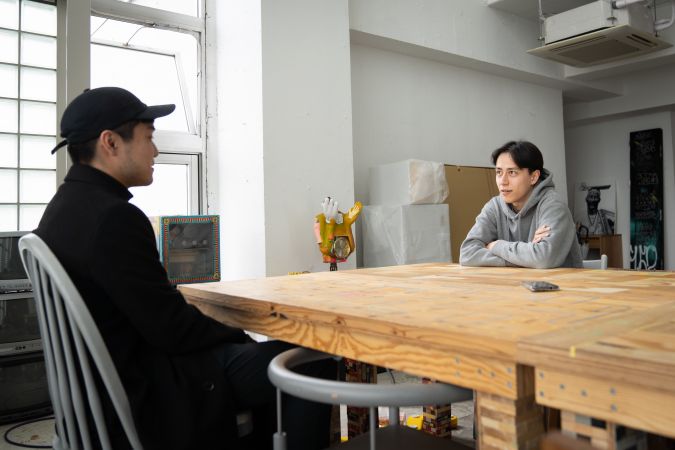
M: So how did you guys meet?
N: We met through VivaOla.
WA: Because they went to school together. And I went to high school with Viva. So we were actually doing sessions remotely from Japan and the US, or Japan and Peru maybe.
N: It was very international. Because I was in the middle of moving around.
M: So the tracks you did together for the mini-album were all remote?
N: All remote, all through zoom. Staying up until 1 AM.
M: Speaking of Viva, that’s kind of how you started doing music, right?
WA: Yeah, yeah. Well, I do have things that happened in my childhood that probably led me to make music. My mom listened to a lot of U.S. and global music. And also I was put in a lot of performative art classes like dancing. But yeah, then I met Viva in high school and the first time I ever wrote a verse for something or wrote a rap was for a school project. Because I saw Viva was trying to do it, you know, trying to pursue it and really taking it seriously, I was like “Well, I guess I could too.”
M: How do you think working with artists like VivaOla and Jua has influenced your approach to music or the sounds that you choose?
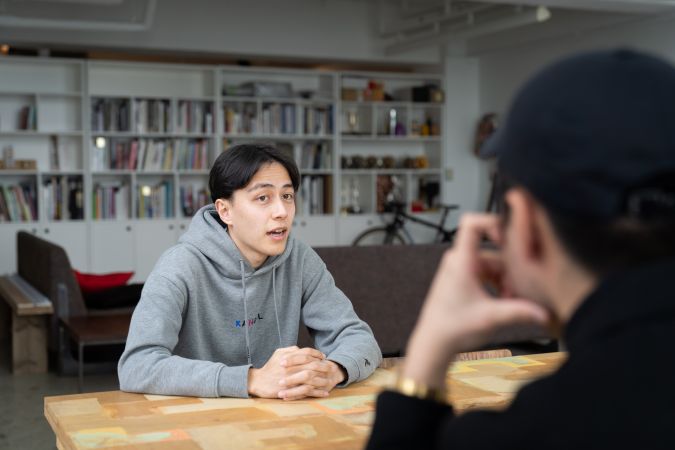
WA: Oh, a lot. I think if I hadn’t met him, I probably would be very comfortable with the type of sound I do and what feels good. I’d probably be doing boom bap for the rest of my life. But I think Viva has always tried to push himself out of his own comfort zone, and I probably followed suit. And so I’m always trying to improve.
M: Do you think that comes from a competitive area?
WA: Yeah, it’s definitely competitive. It’s like “Oh, he could do it,” you know? And I like to be in a position where there’s someone right in front of me that’s slightly ahead. If I was the best guy in the room, I’d probably just get complacent. There’s definitely a competitive nature amongst our community. We’re all friends but we all want to make the best songs.
M: The Shibuya Sound Reverse festival which you guys are performing at has a lot of multicultural artists performing. Do you think that’s indicative of the direction that the Japanese music scene is heading in?
N: I think it’s perhaps a direction that the global music scene is heading in and I think that’s a pattern that we’re definitely going to see more of in Japan as well.
WA: Yeah, we’re still kind of a small community, we’re still kind of a niche thing in Japan. The direct circle of artists around us like me, Nonomi, Viva, michel, Jua, Sagiri, we’re all just friends, we’ve all known each other for a long time. And I think we’re trying to create hype around us, the same way that Tokyo Vitamin or KANDYTOWN have done. But I think it’s not as easy. There’s also a language barrier. And especially for someone like me, who wants people to understand my lyrics and relate to the concepts, It’s been kind of difficult to directly connect to the audience here. But we’re slowly growing, we’re slowly expanding. Even if it does happen in Japan, it’s gonna take way longer. I feel like it’s just a lot different here.
M: Is that a trade-off for you in terms of your lyrical content? How much or how little Japanese or English you use in your tracks?
WA: Yeah, I think so. And that’s why I put translations in all my videos. I rewrite what I said in English but I say it in Japanese. So it’s the most accurate translation because it’s coming straight from me.
And the thing is, it doesn’t matter who listens to my music as long as they like it. So I don’t really need to be like “Okay, I gotta write all my songs in Japanese because I live in Japan.” It’s like, I’ll put it out there and the people that find it will find it, is what I’m thinking right now.
N: Do you identify as a Japanese artist?
WA: I am a Japanese artist but I’m also a global artist. I didn’t just grow up in Japan, most of my culture is Western stuff that I grew up on so yeah, it’s hard to say. I mean, Utada Hikaru just performed at Coachella so yeah, is she a Japanese artist?
M: Speaking of Coachella, other Japanese artists like 88 Rising, Kyary Pamyu Pamyu and a handful of Korean artists were on the lineup this year. It seems like Western audiences are more interested in Asian music at the moment. Do you think that that’s going to have an effect on your career or what you guys are doing?
WA: Yeah, hopefully in a good way [laughs]. Korea is really good at it.
N: Yeah but that’s a decades-long project so it makes sense that it’s popping off right now. But do you feel that from your streams or your audience online? Do people come to you off of an interest in the Asian music scene?
WA: Yeah, yeah, I definitely feel like most of my core fan base is all international.
M: Is it inspiring for you as young Asian artists to see Asian artists performing at Coachella?
WA: Yeah, yeah definitely.
N: Yeah, from a representation point of view it’s very inspiring. From a competitive point of view….
WA: It’s frustrating [laughs].
N: But also very inspiring.
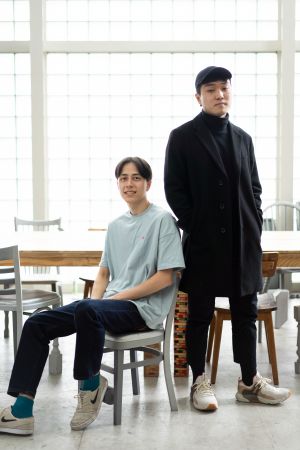
M: It seems like western audiences are becoming more interested in Asian music but what do you think in terms of Japanese audiences with English content?
WA: Hmm. It’s like, if you know, you know. A lot of the really hardcore music fans just find it on their own. They just go out and look for the type of music they like. But, besides that, I think a lot of the acts that are trying to come into Japan are having trouble with that. It’s definitely way more secluded here.
N: I feel like I’m pretty ignorant about the state of affairs in terms of that in Japan but, for example, in K-pop in the Western scene, people don’t really understand the lyrics but they still sing them by heart in concerts. There’s definitely a barrier, but that doesn’t mean that it can’t be broken. And I think streaming definitely contributes to that in the sense that before you had the radio and you had your cliques but now it’s like everyone is in their own world and everyone’s finding their own stuff. I think the direction that it’s going in right now — barriers are being broken.
WA: Yeah, we live in Japan but everyone we speak to on a daily basis is not really Japanese. Especially in Tokyo, it’s a very global place.
N: It’s definitely its own bubble. But personally, I kind of enjoy that because I have Japanese blood so, for me, it would be very easy to integrate, but I don’t fully want to integrate because I come from a different culture, I come with all these new, different ideas. If I were to fully integrate and assimilate into the culture and the environment I think I would lose a lot of that. So in a way, I don’t want to know what the regular Japanese lifestyle is.
M: Yeah I imagine the Japanese music industry experience for multicultural people is probably pretty similar to the experience of living in Japan as a multicultural person. There will always be a certain level of separation.
WA: Yeah. That’s why if I’m hosting events in the future, I want everyone to come through and I want them to mingle and mix. It’s important for our music, too, because it’s hard to understand what someone’s doing when you don’t really know about them or what their culture is, or what their background is. So if more of that mixing goes on then it’s probably better.
M: Is hosting events something you have in mind at the moment?
WA: Yeah, we’re trying to do one in the summer with the Solgasa thing. So I don’t want it to be a closed-off event, everyone is welcome.
N: I think us musically and also personally we kind of epitomize that integration and mixture of cultures. So if we can bring people together and expand that acceptance of different cultures and different ideas and bring it all together, I think that’s just beautiful.
M: How did Solgasa come about?
WA: Solgasa was formed in college when me and michel and Tommi Crane were just sitting in class together and we were all making music individually and we were just like “Yeah we should make a ‘collective’.” I feel like in the 90s everyone had a “crew” and then now we just call it a collective but it’s the same thing [laughs]. And then Viva came in afterward and those were the four members, but now we’re all Solgasa.
M: What are your thoughts on the RASEN Mic relay, Japanese hip-hop artist interview series that Red Bull is doing?
WA: I think I’m kind of leaning further away from the Japanese idea of hip-hop, and I’m kind of going in, I don’t even know what direction it is, indie I guess. The label that I’m with is not a hip-hop label, they have a lot of indie artists and bands. And I think in the states, hip hop is a very big thing where there are all these different subgenres. There’s Chicago rap, there’s Atlanta, there’s LA, Brooklyn, there’s boom bap, there’s trap. And then there’s the conscious rap and I feel like I’m kind of more in that lane of the Chicago rappers like Chance, or Saba or Smino. Or at least that’s what I like. And Japan’s hip-hop scene is probably not big enough yet, even though it’s growing, it’s not big enough yet for people to acknowledge that there are different styles. It seems like hip-hop in Japan is generally trap and kind of trickling down from Migos and Future, that side of hip-hop. And the other side probably hasn’t gotten enough shine yet. And I guess I need to be ‘the pioneer’ or whatever, but it’s hard. So maybe for me personally an easier route would be to not say “Yes, I’m a rapper,” you know? I’ll just be like “Yes I’m an artist right now or I’m a musician.” So maybe the RASEN thing might not fit me. Unless they make a special edition of different styles of artists.
N: Not only in Japan, but I think the rapper label doesn’t really suit you because of the way you approach melodies and jumping into a beat or how you structure a song…
WA: I’ve got songwriter-type tendencies.
N: Yes, there is rap in your tracks but there’s more to Wez Atlas than that I think, especially after seeing you work.
WA: Yeah but if the opportunity is there I want to do it [laughs].
M: Are there any artists playing at Shibuya Sound Riverse that people should check out?
N: Jua.
WA: Jua, michel ko, VivaOla, Sagiri Sol. The Fin.
N: In my opinion, Jua is underrated, seriously underrated.
WA: michel ko hasn’t done a show in so long so I’m really excited to see him. Oh, YAJICO GIRL is pretty dope too.
Catch Wez Atlas and Nonomi performing at Shibuya Sound Riverse on June 5, 2022.

